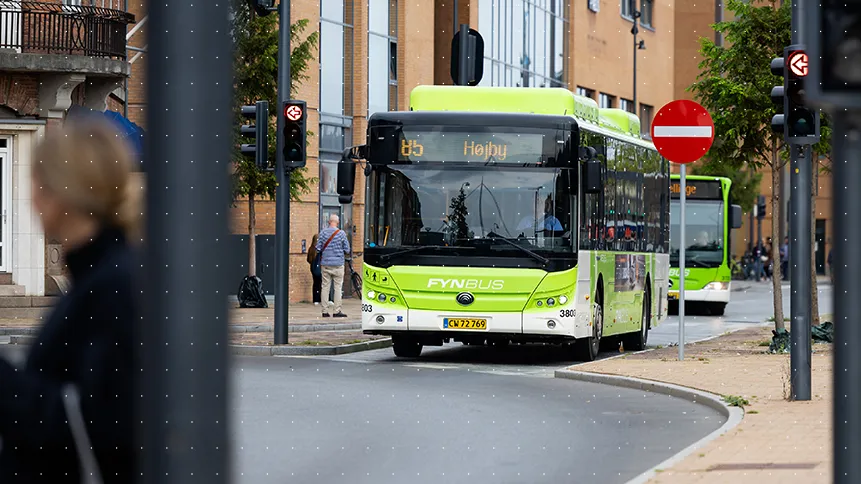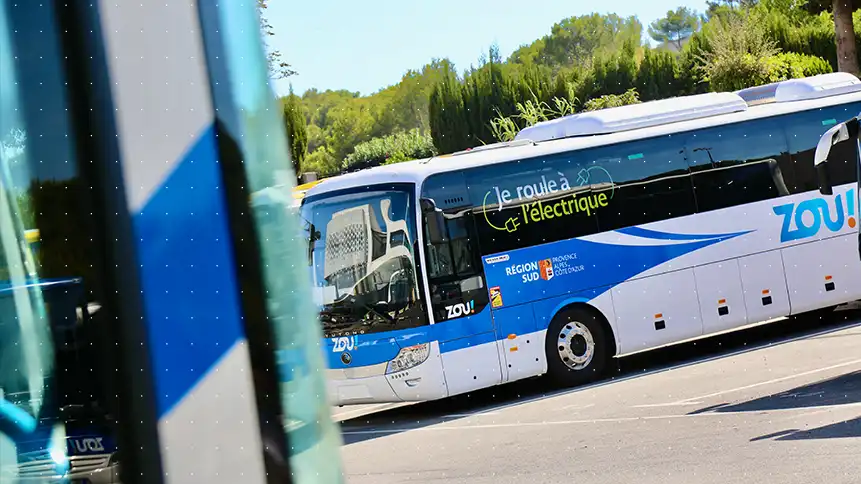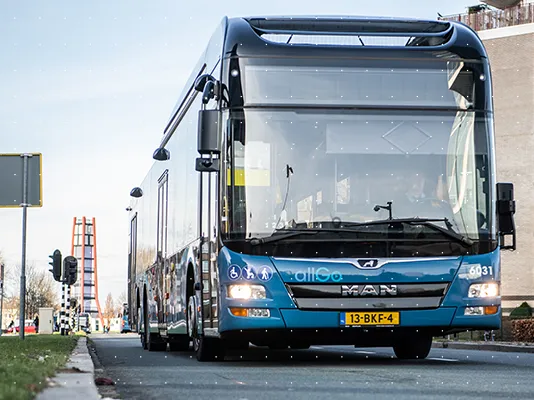Flexible, accessible, comfortable and increasingly clean: buses and coaches are the backbone of many transport networks where Keolis operates. With more than 24,000 vehicles operated in eight countries, Keolis is a heavyweight in the sector, and works hand-in-hand with public transport authorities (PTAs) to accelerate the energy transition.
Keolis, a global expert in bus & coaches networks
Established in eight countries on three continents, the bus and coach networks operated by Keolis make journeys easier for millions of passengers every day. The group’s expertise in this transport mode addresses all the requirements of local communities and their inhabitants: city transport (buses, city centre shuttles, bus rapid transit systems), regional transport (coaches, coach rapid transit systems, tram-buses), school transport and shuttles serving airports or large business and retail parks.
Key Figures
- ~24,000vehicles worldwide
- 8countries: Australia, Belgium, Canada, Denmark, France, the Netherlands, Sweden and the United States
- 5,600vehicles run on diesel-alternative fuels
Buses with top quality service
Keolis places service quality foremost in its priorities. Consequently, the Group regularly conducts surveys among passengers to better understand their habits, their appreciation of the service and the obstacles to using certain modes of transport.
Tracking bus arrivals in real time
On the networks operated by Keolis, passengers can check bus timetables in real time, based on traffic conditions. To do so, they simply enter the line and stop name on the websites and applications developed for each network. On some networks, passengers can call a freephone number to find out when the next bus is due.
Effortless wayfinding on the bus network
Digital applications and websites allow users to consult maps of the bus network online and plan their journeys with peace of mind. Keolis pays particular attention to the signage displayed at bus stops: 3D maps and ‘modal compasses’ help passengers to find their way around the area and facilitate multimodality and the choice of travel modes based on journey times; while vertical and horizontal ‘thermometers’ are used to recall the destinations, stops and points of interest served by each bus route.

Keolis provides made-to-measure transport service offers. Using a mobile application, a website or an online chat, passengers can book their journey in just a few minutes, indicating their departure and arrival stops and desired times. The on-demand bus adapts its routes according to the bookings made. This mode of transport provides a reliable and secure mobility solution for all citizens, wherever they live and whatever their personal constraints.
Improving the passenger experience with data
Whether it relates to passenger journeys, traffic conditions or peak ridership times, data helps in permanently adjusting Keolis’ services to use patterns. In Greensboro, North Carolina (USA), the majority of bus routes use to converge in the city centre. Analysis of the residents' GPS tracks showed that most trips were are actually made within the inner or outer suburbs. Keolis used the finding to make informed recommendations to the local public transport authority on enhancing the service.

Predicting onboard crowding and improving travelling conditions
Predicting the number of passengers on board is a determining factor in their choice of journey and mode of transport. Working with public transport authorities, Keolis tests smart solutions to anticipate peak demand, inform passengers in real time and encourage multimodal shift. In the Netherlands, artificial intelligence is being used to anticipate congestion on the networks based on the weather.
Buses, a sustainable energy transition solution
As an alternative to the private car, public transport is, in its very essence, an initial response to climate change. Keolis works with its PTA partners to go further and imagine the cleaner, low-carbon mobility of the future.
Supporting the use of alternative fuels
Keolis supports public transport authorities in the energy transition of their bus fleets. The aim is to replace fossil fuels with alternative energy sources such as electricity, hydrogen, biodiesel or bioCNG. Targets for 2030? Triple the proportion of mileage travelled by alternative fuel vehicles, and reduce greenhouse gas (GHG) emissions by 30% compared with 2019.
Deploying low-carbon and sustainable solutions to cut carbon emissions
Keolis works with public transport authorities to develop a range of transport services tailored to the needs and circumstances of each community, taking into account current and future regulations, together with the technical and economic feasibility of projects.
In the United States, the Group operates two bus routes and 33 vehicles powered by hydrogen fuel cells on the Foothill network in Southern California.
In France, Keolis began supporting Clermont Auvergne Métropole in September 2024 in its plans to implement entirely hydrogen-fuelled mobility, with the operation and maintenance of 14 hydrogen-powered buses.
In Lille, methane and biomethane are the order of the day. Back in 1990, the local authorities chose biogas as an alternative energy source for their buses. Today, the Métropole Européenne de Lille (MEL) is the only metropolitan area in France with 100% of its bus fleet running on CNG. These 460 buses provide 200 million journeys a year. 30% of the kilometres travelled are powered by biomethane produced locally from household waste.


Furthering local energy strategies
Committed to promoting the most sustainable choices, Keolis’ proposals are based on an in-depth analysis of local issues with a view to optimising the investment made by the local authority. Keolis can accompany the implementation of combined solutions, combining different energy carriers. For example, Bordeaux Métropole is focussing on an energy mix combining bioCNG, electricity and hydrogen, with the aim of constituting an entirely clean fleet by 2025.
Proportion of alternative energy sources in Keolis bus fleets
- 5,600buses run on fuels other than diesel or petrol
- ~ 3,000buses and coaches run on CNG/bioCNG
- + 25%electric buses between 2022 and 2023: amounting to approximately 1,100 buses at end 2023.
Bus solutions tailored to community needs
Ever attentive to the needs of public transport authorities, Keolis builds solutions tailored to each community, whether a medium-sized town or on the scale of a region. In Quebec, for example, Orléans Express coaches connect 35 municipalities every day, covering more than 2,000 km from Montreal to the Gaspé Peninsula.
Increased comfort with bus rapid transit
With their dedicated rights of way, priority at traffic lights, design, comfort, fittings and high-quality services, bus and coach rapid transit (BRT and CRT) systems constitute an effective alternative to private cars on major corridors.
In New South Wales, Australia, the 38 double-decker BRT vehicles of the B-Line, operated by Keolis Downer, make the journey between Mona Vale and Sydney easier for thousands of people every day with comfortable conditions: ample seating capacity, real-time traffic information and upcoming departures.
Another example is in France, where the Burgundy-Franche Comt�é Caisse d’Epargne bank shuttles its employees to work in a gas-powered bus with all the facilities they need to work onboard (a mobile office): a service launched in June 2024.
Made-to-measure school bus services
In an effort to offer passengers ever greater comfort and punctuality, Keolis works with all stakeholders to design its school bus service proposition: PTAs, families and schools. For example, an audit in Beaune showed that starting the school day approximately ten minutes later reduced the number of coaches required from 30 to 21 without affecting service quality.
Metropolitan Regional Express Services: low carbon mobility for easier access to city centres
With its express coach services, Keolis is positioning itself as a key player in France in Metropolitan Regional Express Services (SERM). Here, the aim is to make it easier for people living in suburban areas to get to city centres. Flexible, fast and cheaper to deploy, express coach services offer an alternative to the private car. Passengers are guaranteed a fast, comfortable and safe journey, with attractive fares and a service range combined with other modes of transport.
In the south of France, the 100% electric double-decker coaches on lines 630 and 631 complete the journey between Nice and Sophia-Antipolis in one hour via the motorway. In the Île-de-France region, an express coach service makes the trip between Poissy and Versailles in 45 minutes, also on the motorway. In Grenoble, buses with dedicated motorway lanes serve the suburbs, employment areas and the heart of the city with services every 5 to 10 minutes to encourage more carbon-free multimodal mobility. This model is also used in Sweden between Gothenburg and Borås.
